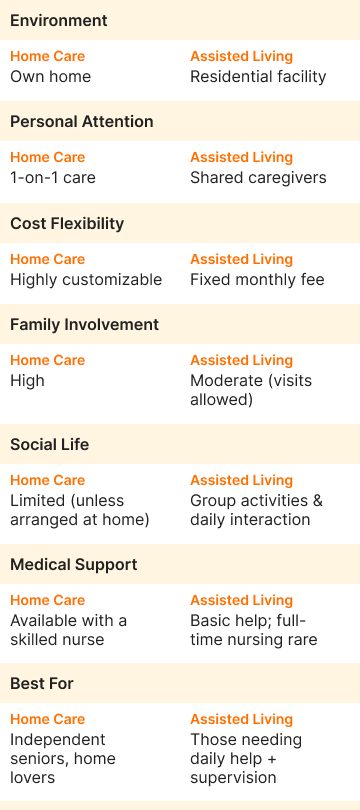Choosing the best care for an aging parent or relative isn’t just a logistical decision—it’s an emotional one. With
so many options available today, one question often comes up: Should we choose home care or assisted living?
This decision depends on many factors: health needs, lifestyle preferences, family support, and—yes—budgets. In this
guide, we break down the key differences between home care and assisted living, compare the costs, and answer common
FAQs so you can make an informed, confident choice for your loved one.
What is Home Care?
Home care involves trained caregivers or nurses assisting seniors in the comfort of their own homes. This can
include help with daily tasks like bathing, dressing, meal prep, medication, and even nursing support when required.
Benefits of Home Care:
- Familiar environment and emotional comfort
- One-on-one personalized care
- Flexibility in hours and services
- Ideal for moderately independent seniors
- Strong family involvement
Average Cost (India):
Depends on the location and services.
- ₹15,000–₹25,000/month for basic caregiving
- ₹25,000–₹50,000/month for trained nurses or 24/7 care
What is Assisted Living?
Assisted living facilities (also called senior living homes or eldercare homes) provide housing, meals, social
activities, and round-the-clock help with daily tasks. They’re ideal for seniors who need ongoing supervision but
don’t require full-time medical care.
Benefits of Assisted Living:
- Structured environment with scheduled meals and care
- Social interaction with peers
- Trained staff available 24/7
- Less stress for long-distance families
Average Cost (India):
- ₹30,000–₹70,000/month depending on the city and amenities
- Premium facilities in metros may go beyond ₹1 lakh/month
Home Care vs. Assisted Living: Side-by-Side Comparison


How to Decide: Key Questions to Ask
1. How much care is needed?
2. Are we talking about help with bathing, mobility, or round-the-clock nursing?
3. Is the home environment safe and senior-friendly?
4. Can it be modified easily for aging in place?
5. Do they enjoy company or prefer quiet spaces?
6. Assisted living encourages social engagement; home care offers peace and privacy.
7. Can the family manage caregiving logistics long-term?
8. Consider work schedules, distance, and emotional bandwidth.
9. What does your loved one prefer? Their emotional comfort matters as much as the care itself.
Real-Life Scenarios
Case 1:Independent but forgetful senior in a metro city
Part-time home care with medication reminders may be ideal
Case 2: Elderly parent with mild dementia and no nearby family
Assisted living with structured routine and supervision works better
FAQs
Q: Is home care always cheaper than assisted living?
Not necessarily. Full-time home care with nursing can exceed assisted living costs in some
cities.Q: Can I combine both?
Yes. Some families begin with home care and shift to assisted living when care needs
increase.Q: Is assisted living like a hospital?
No. Most senior living facilities aim to create a homely, community-driven environment—not
a clinical one.
Final Thoughts
There’s no one-size-fits-all answer. Some seniors thrive with customized care at home, while others benefit from the
community and structure of assisted living. What matters most is dignity, safety, and happiness—whether at home or
in a dedicated care facility.
Need help assessing what’s right for your family?
Senior Care Joy helps families explore both home care and assisted living options
across India—offering verified caregivers, expert advice, and peace of mind for every step of the journey.



